|
|

|
Heeding the Call to Haiti
|
Within
days of the Jan. 12th earthquake that devastated parts of Haiti, MUSC
physicians and volunteers packed their bags and found themselves in the
rural, mountainous terrain of this poor, Caribbean nation as they
provided life-saving care to dozens of critically injured patients.
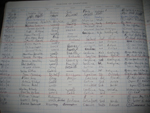 One
page of the operating room register which documents each surgical case
performed at the hospital. More than 125 cases were recorded since the
first earthquake-related surgery was performed by Dr. Robert Belding
(Columbia) Jan. 18, six days after the 7.0 magnitude quake. One
page of the operating room register which documents each surgical case
performed at the hospital. More than 125 cases were recorded since the
first earthquake-related surgery was performed by Dr. Robert Belding
(Columbia) Jan. 18, six days after the 7.0 magnitude quake.
Since the event, MUSC and the Department of Orthopaedics have sent two
multi-disciplinary medical surgical teams to provide early relief
efforts working with medical volunteers at Hopital Lumiere, located in
Bonne Fin in Southern Haiti. The effort is considered a start in what
will be a collaborative, ongoing effort.
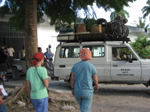 Members
of a second team of medical volunteers from Indiana walk toward Hopital
Lumiere to assist with unloading supplies from the roof of the
mission’s Toyota Landcruiser. The supply load from the two medical
groups combined weighed more than 800 lbs. Members
of a second team of medical volunteers from Indiana walk toward Hopital
Lumiere to assist with unloading supplies from the roof of the
mission’s Toyota Landcruiser. The supply load from the two medical
groups combined weighed more than 800 lbs.
The first surgical team was led by pediatric orthopaedist Rick Reed,
M.D., and orthopaedic surgeon and long-time Haitian medical volunteer
Robert Belding, M.D., of Columbia. A second team, composed
of orthopaedic surgeon Shane Woolf, M.D., Megan Fulton, P.A.,
with the Department of General Surgery and orthopaedic trauma nurse
Jennifer Haughney, 10 West, shuttled in more than 400 pounds of donated
supplies and provided ongoing help in treating wounds, performing
surgeries and saving the limbs of dozens of patients. The group got
pediatric nurse Susan Wimberly, R.N., to stay another week to continue
treating patients and to prepare for the next team.
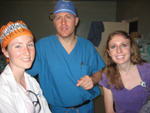
MUSC
volunteers Fulton, left, Woolf and Jennifer Haughney, R.N., were among
the first volunteers involved in the early relief effort at Hopital
Lumiere.
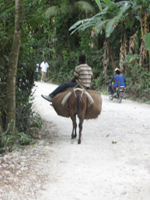 Travel by motorcycle and mule are two common ways to get around in Haiti. Travel by motorcycle and mule are two common ways to get around in Haiti.
 MUSC
physician assistant Megan Fulton and a certified registered nurse
anesthetist helped the Haitian operating room staff place a spinal
anesthetic prior to surgery. MUSC
physician assistant Megan Fulton and a certified registered nurse
anesthetist helped the Haitian operating room staff place a spinal
anesthetic prior to surgery.
Since the earthquake, more than 125 surgeries have been performed by
the medical teams at this small rural hospital. Additional trips are
planned, with MUSC teams working with local medical personnel, Haitian
communities and worldwide relief organizations such as the United
Nations, Red Cross.
Jerry Reves, M.D., vice president of clinical affairs and dean of the
College of Medicine, said he can think of no better way for MUSC to
thank Reed, Woolf and the MUSC medical volunteers for their service
than to see that this effort is continued.
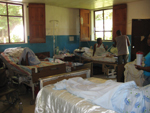 One
of the patient rooms at Hopital Lumiere in Bonne Fin, Haiti with 8-10
beds per room. Many patients stay in this setting for months while
recovering.There is no running water in the hospital and the restrooms are either a bedpan or latrine outside the hospital. One
of the patient rooms at Hopital Lumiere in Bonne Fin, Haiti with 8-10
beds per room. Many patients stay in this setting for months while
recovering.There is no running water in the hospital and the restrooms are either a bedpan or latrine outside the hospital.
HOW TO HELP?
The MUSC Orthopaedic Disaster Training Fund was established through the
MUSC Foundation to help provide supplies needed to assist in the Haiti
Hopital Lumiere effort and in other disaster events involving MUSC
medical relief teams.
To donate, visit the MUSC Foundation Web site at
http://academicdepartments.musc.edu/development/online_donation/index.html. Next select the College of Medicine and scroll to Orthopaedic Disaster Training Fund.
 Orthopaedic
surgeon Shane Woolf instructs as Dr. Rudolph Richeme, one of the
Haitian physicians, treats a wound. The physicians and hospital staff
have been working without pay for more than nine months because of
severe financial hardship at the hospital. Despite this, every staff
member continued to work long hours each day with unflagging spirits. Orthopaedic
surgeon Shane Woolf instructs as Dr. Rudolph Richeme, one of the
Haitian physicians, treats a wound. The physicians and hospital staff
have been working without pay for more than nine months because of
severe financial hardship at the hospital. Despite this, every staff
member continued to work long hours each day with unflagging spirits.
Friday, Feb. 19, 2010
|
|
|









